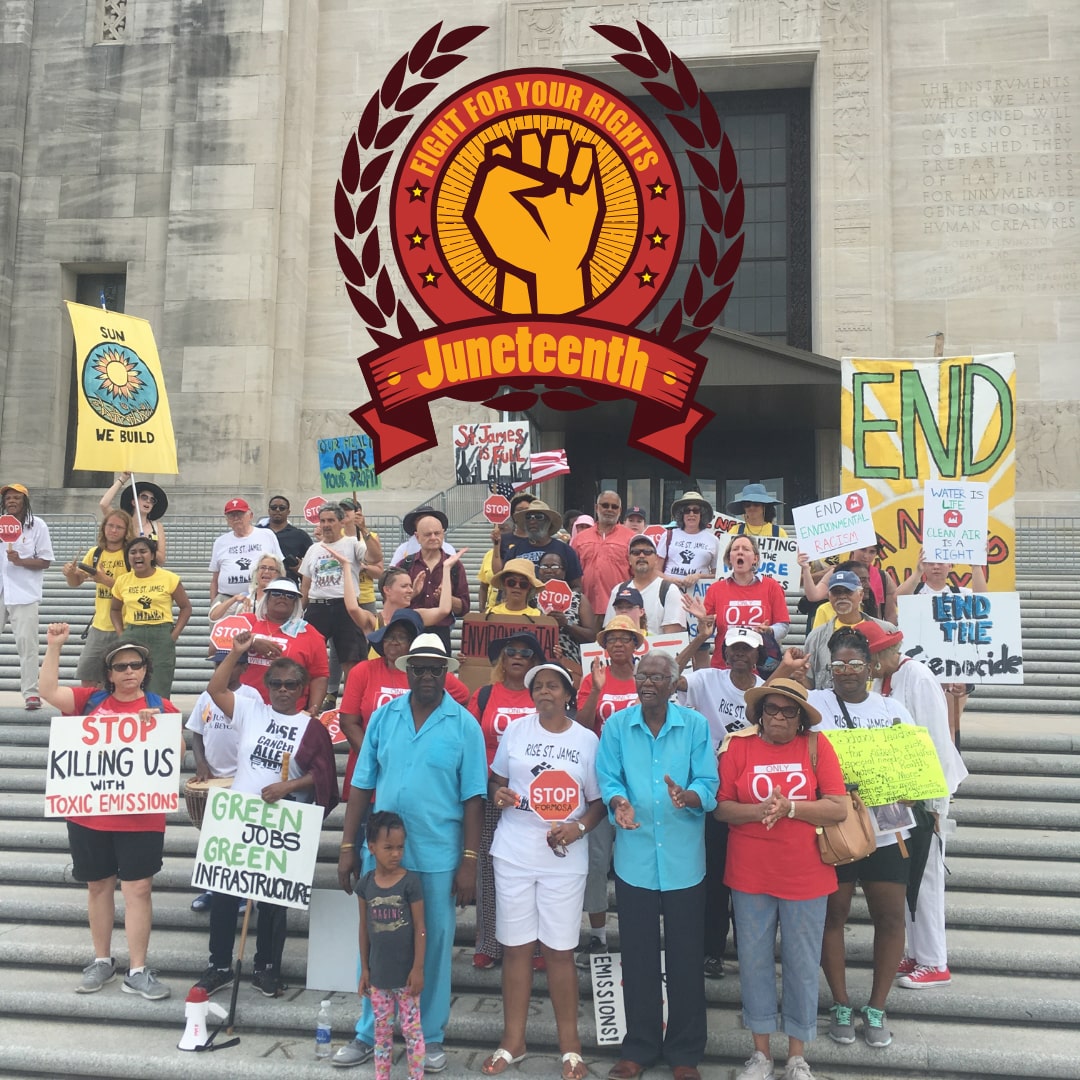Break Free From Plastic works to envision a future free from plastic pollution that advances environmental justice, social justice, and racial justice all together as part of a single, globally-connected Movement for Justice.
The plastic pollution crisis disproportionately impacts communities of color, including particular harm that the petrochemical industry does to Black, Latinx, and Indigenous communities in the U.S. Earlier this year, UN human rights experts denounced environmental racism in the “Cancer Alley” region of Louisiana with the following historical context: “Originally called Plantation Country where enslaved Africans were forced to labour, the petrochemical corridor along the lower Mississippi River has not only polluted the surrounding water and air, but also subjected its mostly African American residents to cancer, respiratory diseases and other adverse health effects.” Additionally, the Clean Air Task Force estimates that 1.8 million Latinx people in the U.S. have increased odds of respiratory illness and fertility issues because they live within one-half mile of an oil and gas facility. Many of these companies are extracting and refining fossil fuels in order to make plastic, and generating toxic emissions in the process. Beyond the issues caused by this “upstream” pollution, there are additional challenges around plastic incineration, landfill, and other “downstream” waste in communities of color across the country.
We are honored to work together with groups who are protecting their communities from the harmful impacts of plastic at every part of its lifecycle. Today, in recognition of Juneteenth, we are celebrating a few of the many inspiring Black community groups leading this fight in the U.S.
June 19, 1865—known as Juneteenth—marks the emancipation of the last remaining enslaved African-Americans following the end of the U.S. Civil War. On June 19, 2020, the BFFP US Coordination Team launched Community Action Micro-Funds for Black Communities on the Frontlines of the Plastic Pollution Crisis. With the support of the Plastic Solutions Fund, we provided $40,000 in micro-funds in 2020 to support local organizations working on protecting Black communities from the impact of plastic pollution.
As the U.S. government recognized Juneteenth as a federal holiday for the first time this year, we are shining a light on the important work that seven environmental justice groups are doing to protect Black communities from the harms caused by plastic.
In Louisiana, local leaders are working together to advocate for their fellow community members and stop the petrochemical industry. The Concerned Citizens of St. John the Baptist Parish (CCSJ) recently installed four new air monitoring sensors in collaboration with RISE St. James and other local organizations. This is vital work because St. John the Baptist Parish houses more than 200 refineries, plastic manufacturers, and petrochemical facilities, and the rates of asthma among children are 2.5 times higher there than the national and state averages.
With this air monitoring data, CCSJ and RISE St. James are developing informational flyers designed to raise awareness about the sources and risks of local industrial emissions. This project empowers residents to challenge industry-generated messages, participate actively in regulatory permitting processes, and advocate for community-centered solutions as they hold government and industry officials accountable for the harms of plastic pollution.
RISE St. James has also hosted community events that bring people together to celebrate their history while advancing their broader campaign to stop Formosa Plastics from building a giant petrochemical complex in St. James Parish, Louisiana. On June 19, 2020, RISE St. James hosted a Juneteenth convocation to honor the lives of their members’ enslaved ancestors who are buried on land where the proposed Formosa Plastics complex has been sited. In October, they also hosted an “All Saints Day Service” to celebrate the lives of their enslaved ancestors at the same gravesites. These events bring community members together to acknowledge the history of racial exploitation, discuss the ongoing prioritization of profits over people, and take action to realize environmental justice.
In New Orleans, The Louisiana League of Conscious Voters has done incredible work on outreach, education and advocacy that enables Black Louisianians to know their rights and advance strategies to prevent the petrochemical industry from passing bills that would create more plastic pollution and decrease corporate accountability.
At the same time, groups in Texas and Illinois are further advocating for change through their local municipalities. The Port Arthur Community Action Network has developed and proposed new City Hall programs to reduce plastic pollution, concentrating on intervening in the state permitting process to target petrochemical facilities directly in order to reduce all forms of pollution and environmental contamination. Meanwhile, after the Chicago Housing Authority canceled its recycling contract without any community input or prior notice, the People for Community Recovery developed a campaign to bring back the community-led recycling program and implement community education projects about the negative effects of plastics in the environment.
Focusing on “downstream” pollution, the West Atlanta Watershed Alliance has installed and maintained floatable plastic trash interceptors within the Proctor Creek tributary and Chattahoochee River Watershed. In addition to collecting debris, this project has also created an opportunity to develop and evaluate measurable recycling and stewardship activities while enabling youth engagement and education on the environmental and public health impacts of plastics. Also in the State of Georgia, the Susie King Taylor Women's Institute and Ecology Center has been advocating for more compostable utensils and drinking products manufactured from biodegradable sources as part of their work pressuring corporations to change their plastic packaging practices and move towards building zero waste communities.
Across the United States, these inspiring leaders continue working to protect Black lives and communities from the impacts of plastic pollution and the petrochemical companies that cause this harm. Once again, we raise our voices together with one unified message: Black Lives Matter.




